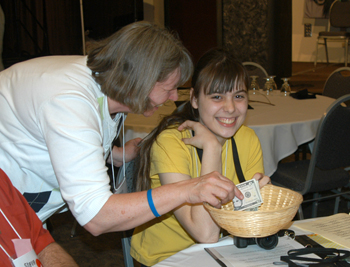| Search PNC News for stories of people and churches in our UCC Conference: |
|---|
Pastor shares insights on doing youth ministry
By Donald Schmidt - Partner in Education
Ah, youth ministry. We probably all agree our churches need it, and that we ought to provide it. The questions are: How? What? By whom?
 |
| Tara Leininger of Metaline Falls donates to Sophie Crapson of Ritzville, raising funds for youth. |
The first step in creating a good youth ministry is not to be afraid of it. Youth don’t bite. (No, really, they don’t.)
They are young, eager, unpredictable, excited, bored, confused, often readily distracted, and most of all they are eager for a forum to deal with spirituality—just not too seriously.
When starting a youth group, it’s important to have good leader. The church needs to take some time to find the right person. Too often people readily assume that the local “cool dude with a guitar” will fit the bill, because he or she is close to their age and can readily relate to them. That’s not always the case.
Age proximity does not equal good connection, especially when dealing with young people who can be all over the map in terms of developmental abilities.
In addition, when a church finds a young person—or anyone—interested in leading youth group, they need to check him or her out. Some of the best youth leaders in churches of all denominations are young people, often college students, who can provide leadership and also easily join the youth in their journey of faith discovery.
Some, however, have ulterior motives. Some people who want to prey on young people are not necessarily the proverbial dirty old men. More than one girl has found herself pregnant courtesy of a youth leader.
Conducting an interview and doing a background check of any applicant for youth ministry is vital—an interview and background check is important for church school teachers as well. The interview should be tailored to the needs of the church and the youth group. The interview team should involve a couple of youth. Involving two helps diffuse the sense that they are just a token, and that the decision will be made by adults.
Churches need to recognize that youth are busy, and lower their expectations about attendance. Because some youth, are involved in some kind of sports activity, it’s important to accept that and not imagine that everyone will show up all the time.
At the same time, leaders need to hold youth accountable. If they have enthusiastically agreed to go help at the food pantry, and the leader has set up that activity, it’s okay to expect them to show up and participate, even if it means they go to a friend’s house or the mall a little later than planned. Youth appreciate boundaries and people having serious expectations of them, without using guilt.
Youth leaders can dare to be progressive. In the United Church of Christ, we’re noted for extravagant welcome and acceptance of divergent theologies, viewpoints and identities.
That should be part of a youth group. There are many options in other churches for a rigid, “you-need-to-believe-this” style of youth programs, which work for some youth.
UCC youth leaders need to be assured that there are a huge number of youth for whom that does not work. They need to know they are loved and accepted, no matter what. They need to know they can bring up and discuss all kinds of issues without repercussions. After all, they’re youth and they are exploring everything in the universe.
Simply learning that church is a safe place can be enough, and can equip youth for those times later in life when they need to turn somewhere. If they remember the church is an option, then we have done them an amazing service.
So while mega-churches may tell their youth what they must do one moment to the next, UCC churches can focus on helping youth learn how to live day by day.
That includes daring them to deal with tough issues, and tough opinions. Being flexible with youth doesn’t mean our church doesn’t have a theology, it just means we do not impose our theology.
Youth leaders can say, “That’s intriguing. I have a different view, but you could be right,” and then share their view. Telling kids what they have to believe will usually backfire.
The website www.rethinkingyouthministry.com, offered by two Disciples of Christ youth ministers, provides resources, activities and a blog that brings up important issues.
It does that in a progressive vein, which can be a rarity in youth resources.
Finally, it’s important to just do youth ministry, setting aside fears. Having a paid professional who can provide youth ministry is good, but volunteers can be excellent, too.
Having worked off and on with youth groups for about 30 years, I can tell you that the rewards are amazing.
I learn so much when I listen to youth. I think they listen to me sometimes, too, and that’s a real bonus.
The Rev. Donald Schmidt has been a pastor in various denominations since 1978. He currently is pastor—and one of the youth leaders along with his partner—at Admiral Congregational United Church of Christ in Seattle.
For information, call 206-932-2928 or email pastor@admiralchurch.org.
Copyright Pacific Northwest Conference News © November-December 2010
